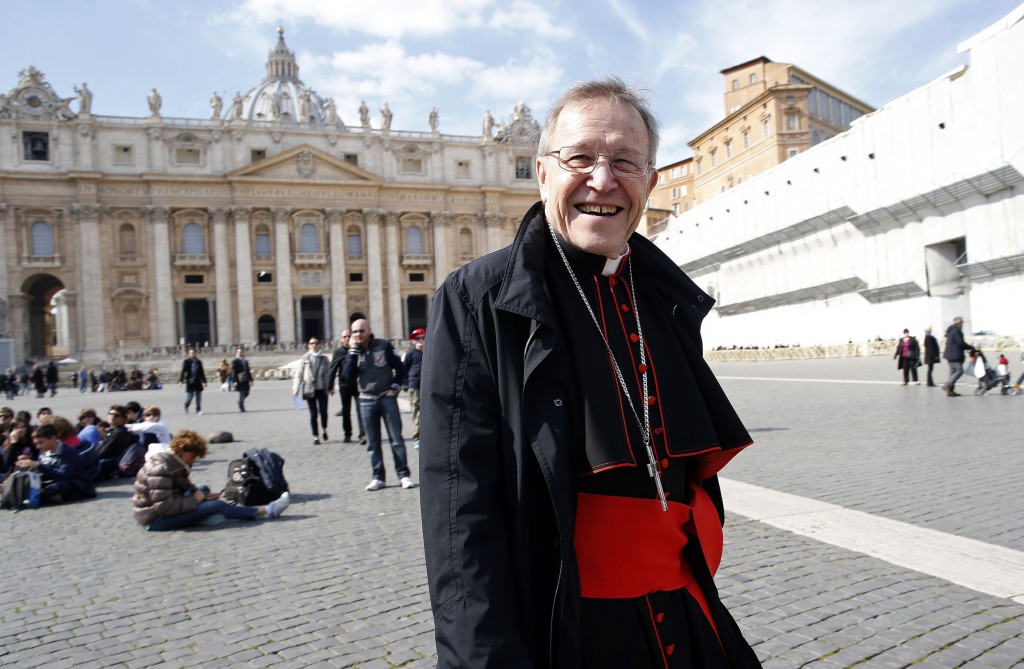
By Cindy Wooden
The election of Pope Francis marks a new phase in the Catholic Church’s process of fully understanding, responding to and living out the teachings of the Second Vatican Council, said Cardinal Walter Kasper, who was part of the conclave that elected the new pope.
“From the first day of his pontificate, Pope Francis has given what I would call a prophetic interpretation of the council and has launched a new phase of its reception,” the cardinal said in a speech prepared for an April 12-13 conference in Bergamo, Italy. The speech was published in the Vatican newspaper.
Cardinal Kasper, a theologian and retired president of the Pontifical Council for Promoting Christian Unity, said Pope Francis continues to remind Catholics they are called to follow Christ, “who became poor for us,” and to remind them of the “poverty and apostolic simplicity of the church.”
The March 13 election of a pope from Argentina also highlights the need for the church to respond to the poverty afflicting the majority of the world’s population and to the fact that most of the world’s Catholics live in the global South, Cardinal Kasper told the conference.
The conference, looking specifically at the contributions of popes to the council and its implementation, was sponsored by the John XXIII Foundation in Bergamo and the Paul VI Institute in Brescia. The two institutions are named for the popes who presided over the council sessions from 1962 to 1965.
Cardinal Kasper said each of the major ecumenical councils in church history was followed by a time of some turbulence and that it took decades, sometimes centuries, for its teachings to be fully understood and implemented. He outlined not only the visions of the two popes who presided over the council, but also the contributions Blessed John Paul II and Pope Benedict XVI made to proper understanding and implementation of the council.
Pope Benedict’s teaching about the need for “reform and renewal in continuity” with the church’s tradition means the church must continue to respond to changing circumstances, showing how the Christian faith can answer the questions and needs of all people at all times, he said. The cardinal said Pope Benedict’s remarks were not meant to deny the need for reform, but to remind people that the church must be the church.
“A church that bases itself on the social mainstream becomes superfluous,” Cardinal Kasper said. “It does not become interesting by decorating itself with feathers that don’t belong to it, but by stating its case in a credible and convincing way.”
One of the challenges, he said, is precisely the need to recognize that the world’s Catholic population has shifted, and Pope Francis already “has changed the agenda: topping the list are the problems of the Southern Hemisphere.”
“The situation of the church has changed since the time of the council. At the beginning of the last century, only a quarter of the world’s Catholics lived outside Europe; today only a quarter live in Europe,” and the South is where the Catholic population is growing most.
All of that makes the problem of unity in diversity even more important today, he said. The Petrine ministry of the pope is “a true gift of the Lord to his church” because it provides a focal point for unity, but that “does not mean accepting an exaggerated centralism.”
“Therefore, it is very significant that Pope Francis has referred to (himself as) ‘the bishop of Rome who presides in charity,’ the famous affirmation of Ignatius of Antioch,” Cardinal Kasper said. Focusing on presiding in charity is important in relations with other Christians, but also for the life of the church itself.
While the Second Vatican Council saw a challenge in dealing with atheists, Cardinal Kasper said the church today must find a way to deal with the millions of people who believe the whole question of God simply isn’t relevant to their lives: “The problem is indifference.”
Still, he said, those same people ask questions about the meaning of life, why there is suffering and how to find happiness.
“We must not speak of a vague transcendence, but we must speak concretely of God, who in Jesus Christ revealed himself as God with us and for us, as the infinitely merciful God who awaits us, who gives us another chance in every circumstance and whom we, in prayer, can call ‘Father.'”
Cardinal Kasper said the journey toward Catholic renewal begun by the Second Vatican Council has not concluded. “We must continue, with patience, but also with determination and courage and, despite everything, with interior joy.” – CNS